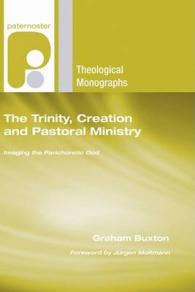Full Description
Bring to life the power of nature-based pedagogy and emergent curriculum to enhance learning for children. This book will clarify how to implement seasonal, nature-based, emergent curriculum with practical strategies for indoor and outdoor settings. Emergent curriculum is an approach that engages with children's interests to plan curriculum, in contrast to teachers planning the curriculum around a theme without input from children.
Emergent curriculum is a central feature of NBECE, yet it is widely misunderstood in the context of outdoor learning. Readers will discover how emergent curriculum underpins NBECE pedagogy in lockstep with developmentally appropriate practices. This book provides a definition of nature-based early childhood education (NBECE) as it is applied in American early childhood settings. Each chapter contains topics that form the backbone of a nature pedagogy framework.
Learning in nature is certainly not a new concept. It is as old as time and human existence. But in recent years, a renewed interest to unplug and get back to basics has brought this movement to the forefront of early childhood education. Until now, nature-based approaches have been loosely lumped into a bucket of environmental education, outdoor education, or recreation unless a school or program explicitly refers to itself as a forest or nature preschool, forest kindergarten, or something similarly named. This book defines nature-based early childhood education as its own educational philosophy. And while it is already being applied in forest and nature preschools, it is spreading into every imaginable early learning environment.
At the opening of each chapter, you will find Guiding Questions as a starting point for reading. There are further Reflection Questions at the conclusion of each chapter to encourage more thought about what you have read. These questions may challenge previously held beliefs or practices as you examine how to apply new knowledge to your unique setting. The Teacher's Call to Action is a related challenge to help you deepen your understanding of nature pedagogy.
Each chapter also includes examples of how NBECE is applied in programs across the United States. Research and best practices from nature-based early childhood education experts provide diverse perspectives for you to consider. An appendix includes workbook-style templates that teachers can pull out for outdoor/classroom use, to advocate with families/communities, communicate with parents, assess/reflect on their program and staff, document authentic learning.
The foreword will be written by David Sobel who has spent the last twenty-five years working in the field of child development, place-based education, and parenting with nature. He currently serves as Senior Faculty in the Education Department at Antioch University New England in Keene, NH. His expertise and passion has led to authoring seven previous books and being identified as one of the "gurus and rock stars of environmental education" by Teacher magazine.
Contents
1 What is Nature Pedagogy?
Historical Bird's Eye View
Unpacking Nature-Based Education
Kindred Spirits of Educational Philosophy
Ensuring Equity and Access to Nature-Based Education
2 Benefits of Nature-Based Education: Proof is in the Mud Pie
Is it Education or Nature Play?
Benefits and Skill Development
Affordances of Natural Learning Environments
Natural Materials and Loose Parts
3 Roles and Responsibilities of Nature-Based Teachers
Teacher as Researcher and Guide
The Third Teacher: Nature
Managing Risk and Conflict in Outdoor Settings
Commitment to Personal Growth & Nature Connection
4 Honoring Every Child
Family Culture, Background, and Tradition
Forming an Ecological Identity
What is a 'Capable Learner'? Child-Directed Learning, Self-Help Skills, and Risky Play
Children with Diverse Abilities and Special Needs
5 Creating Community with Families
Parent-Teacher Communication
Ways to Address Bias to Better Support Families
Seasonal, Place-Based Family Events
Parents as Advocates
6 Curriculum: Emergent Experience and Intentional Teaching Practices
How to Plan and Facilitate Emergent Curriculum
Role of Academics
Class Flow and Daily Rhythm
Authentic Documentation and Assessment
Venturing Out: Safety Routines and Risk Management
Appendix with templates








